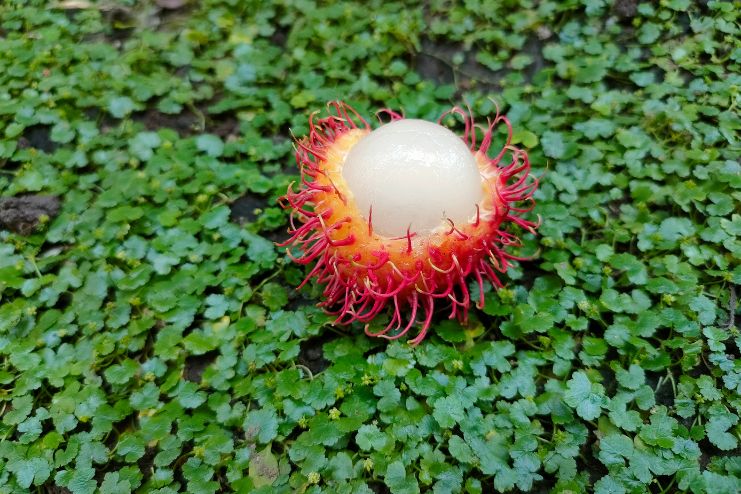Affiliate Disclaimer
Some links in this article are affiliate links. We may earn a small commission if you make a purchase through these links, at no extra cost to you. We only recommend products we find useful to our readersSoutheast Asia’s unique tropical fruit, the Rambutan, is frequently compared to lychee because of its similar size and delicious, translucent flesh. But what makes the Rambutan unique is how it looks—it is covered in silky, hair-like spines that give it a bright, exotic appearance.
The word “rambutan” is derived from the Malay word “rambut,” which means “hair.”
A ripe rambutan is a delicious delicacy with a sweet, somewhat creamy, and slightly acidic flavor when you bite into it. Tropical regions love it for its refreshing juiciness and soft, jelly-like texture.
In addition to being delicious, Rambutan has several unexpected health advantages. Packed with antioxidants, fiber, and vitamin C, it helps digestion, strengthens immunity, and encourages glowing skin. But that’s only the start! Rambutan is more than just an exotic fruit; it’s a nutritional powerhouse just waiting to be discovered, with benefits ranging from improving hair health to cleansing the body.
Read More: Fruit Juice Or Whole Fruits? Difference and Advantages!
Nutritional Profile of Rambutan
Rambutans are a good source of several vitamins and minerals and exceptionally high in vitamin C. Water-soluble vitamin C is a potent antioxidant in the body and is crucial for skin and immune system health.
Antioxidants neutralize free radicals, which are reactive molecules, and prevent the development of illness. Too many free radicals may result in negative health effects. Additionally, vitamin C has anti-inflammatory qualities.
Maintaining appropriate blood levels of vitamin C may also help prevent heart disease by lowering risk factors for the disease, including high blood pressure, and decreasing atherosclerosis or the accumulation of plaque in the arteries. The USDA provides the nutrition data listed below.
Table: Nutritional value of 100 grams of syrup-packaged canned Rambutan
| Nutrient | Value |
| Water (grams) | 78.04 |
| Energy | 82 |
| Energy (kJ) | 343 |
| Protein (grams) | 0.65 |
| Total fat (grams) | 0.21 |
| Ash (grams) | 0.23 |
| Carbohydrates, by difference (grams) | 20.87 |
| Fiber, total dietary (grams) | 0.9 |
| Calcium (mg) | 22 |
| Iron (mg) | 0.35 |
| Magnesium (mg) | 7 |
| Phosphorus (mg) | 9 |
| Potassium (mg) | 42 |
| Sodium (mg) | 11 |
| Zinc (mg) | 0.08 |
| Copper (mg) | 0.07 |
| Manganese (mg) | 0.34 |
| Vitamin C, total ascorbic acid (mg) | 4.9 |
| Thiamin (mg) | 0.01 |
| Riboflavin (mg) | 0.02 |
| Niacin (mg) | 1.35 |
| Pantothenic acid (mg) | 0.02 |
| Vitamin B6 (mg) | 0.02 |
| Folate, total (µg) | 8 |
| Carotene, beta (µg) | 2 |
| Vitamin A (International Units) | 3 |
Read More: Lack Of Fruits And Vegetables In The Diet Can Impose Risks Of Heart Health
Rambutan Health Benefits

Strengthens the Immune System:
Rambutan’s high vitamin C concentration supports the generation of white blood cells, promoting immunological function. Some rambutan fruit extracts may aid in the fight against illnesses and stop viruses from spreading.
Encourages Bone Health:
Age-related bone loss is unavoidable to some degree. However, a nutritious diet and regular exercise can decrease the rate and severity of this problem. Because of the effects of potassium, higher intakes of fruit, such as Rambutan, are linked to higher bone mineral density. Rambutan may aid in preventing osteoporosis and bone turnover by lowering calcium excretion in the urine.
Reduces the Risk of Diabetes:
People with diabetes frequently think that fruit is too sweet to be part of their diet. On the other hand, fruits like Rambutan have comparatively low sugar content and several health advantages (particularly when compared to other sweets or processed foods). However, diabetics should avoid fruit that has added sweeteners or is heavy in syrup.
Might help with Weight Loss:
Rambutan can help you feel fuller for longer and lower your chance of overeating because it is high in fiber and low in calories (100 grams has 75 calories). Rambutan’s soluble fiber becomes a gel-like material in the stomach after dissolving in water. This gel-like material reduces hunger by slowing down nutrition absorption and digestion. Additionally, the high water content of Rambutan contributes to its satiety.
Read More: Fruits For Weight Loss: 18 Fruits That Shed Off Unwanted Fats
May aid in the Prevention of Cancer:
Vitamin C and other antioxidants, like phenolic chemicals, methanolic compounds, and anthocyanins, are abundant in Rambutan. Antioxidants are thought to help prevent cancer, yet there isn’t much data to back up this claim. Antioxidants may lower the risk of cancer by minimizing cellular damage.
Uses of Rambutan for Skin and Hair

In addition to being consumed as ripe fruit or juice, Rambutan has unique health benefits and therapeutic qualities when applied topically to the skin and hair. Rambutan essential oil, which is extracted from the fruit’s flesh, outer skin, and leaves, can also combat infectious agents like bacteria and fungi to prevent skin and hair problems.
Provides Anti-Aging Advantages:
Spermidine, found in Rambutan, helps postpone the aging process of skin cells. Additionally, the carotene class of flavonoid plant antioxidants is crucial in lessening the visibility of sunken skin, fine lines, and wrinkles. Applying moisturizers, oils, and creams containing Rambutan promotes the synthesis of collagen, a protein necessary to preserve the firmness and elasticity of skin texture.
Encourages Hair Growth:
In addition to its skin-benefitting properties, Rambutan encourages hair development and thickness. The vitamin C and antioxidants in rambutan fruit and juice support the growth of long, healthy hair by fortifying the follicles, which are the roots of the hair. It guarantees the total elimination of dangerous free radicals that result in brittle and thin hair.
Read More: The Best and Worst Fruits For Diabetics
Cuts Down on Skin Inflammation:
Several critical amino acids found in rambutan aid in developing healthy skin cells and reduce the tendency for skin exposed to harsh climatic conditions to become swollen and red. Its high flavonoid concentration gives it antioxidant qualities that help fight off free radical damage, reduce skin irritation, and minimize acne, scars, and dark spots.
How to Consume Rambutan
You can eat Rambutan fresh, in a can, or as a jam or juice. Eating them fresh is the most excellent way to reap the health advantages. Since the shells’ spines are gentle and harmless, you can peel the skin off. There is a bitter, inedible seed non the fruit’s core. You have two options: either cut the fruit and remove the seeds or suck the fruit slowly to spit out the seeds and savor the juice.
Here are Some Pointers for Serving:
- Enjoy fresh Rambutan by itself, without any seasonings or other ingredients.
- Its parts make an excellent garnish or accent to fruit salads.
- A cool summertime beverage is rambutan juice or syrup.
- You can add frozen Rambutan to your cocktail drink.
- You can also add Rambutans to ice cream.
Read More: Best Ayurvedic Fruits For Proper Nutrition
Side Effects Of Rambutan

The majority of people believe that eating rambutan fruit flesh is harmless. Although allergies to Rambutan have been documented, they are rare. If you have a Rambutan allergy, avoid eating Rambutan and any goods produced from it.
When consumed in moderation, rambutan fruits do not cause any health issues and are a wealth of nutrients and wellness benefits. However, consuming too much Rambutan can result in digestive and gastrointestinal problems like constipation, stomach ulcers, and acid reflux.
Fresh Rambutan is nutrient-dense, but some rambutan products include a lot of added sugar. For instance, each serving of Rambutan canned in heavy syrup may have many tablespoons of added sugar. Since several illnesses, including heart disease, have been linked to high-sugar diets, limiting added sugar consumption promotes overall health.
According to American Heart Association (AHA), adults should consume not more than 6–9 teaspoons of added sugar per day, or 6% of their daily calories. To cut down on added sugar, opt for fresh rambutans wherever possible or rinse and drain canned rambutans in heavy syrup.
Additionally, the sugar in overripened rambutan fruits converts to alcohol. Consuming such large quantities of alcoholic leftovers always raises blood cholesterol levels, which can be harmful to diabetics and people with heart conditions.
FAQs
- Is Rambutan Toxic?
The rambutan fruit’s skin and seeds contain hazardous substances, so you should avoid them, but its luscious flesh is perfectly safe to eat.
- How Does Rambutan Taste?
A tasty tropical fruit, Rambutan is renowned for its juicy, sweet taste with a touch of sourness. Its flavor is often described as a lovely blend of grape and lychee, providing a faintly flowery, somewhat creamy, and refreshing experience with each bite.
- Can I eat Rambutan Seeds?
Since rambutan seeds contain saponins, which can be harmful in high concentrations, most experts advise against eating them raw, even though they are technically edible. If you must eat the seeds, roasting them first may lower the amounts of toxins, but moderation is still essential.
Read More: Do You Know These Dry Fruits Benefits
Conclusion
Rambutan is a nutrient-rich superfruit with many tremendous health advantages, making it more than a tropical treat. This unusual fruit promotes general health by increasing immunity with vitamin C and enhancing digestion with fiber. Its high antioxidant concentration supports healthy hair, glowing skin, and a stronger heart. The natural sugars in Rambutan also keep you hydrated and provide a rapid energy boost.
Outside of tropical areas, Rambutan is still an undervalued fruit despite its many advantages. If you haven’t already, this is the ideal time to include this tasty and nourishing fruit in your diet. When consumed raw, in smoothies, or mixed into salads, Rambutan provides a tasty and nutritious experience.
Include Rambutan frequently in your diet to take advantage of its potent nutrients and distinct flavor. Modifying a minor fruit choice can have a significant impact on your health!
-
Feb 2018Written by Sumana Maheswari
-
Apr 2025Edited by Ankita
In this Article

















